Kenyon: Dartmouth men’s basketball team works to make history off the court
| Published: 12-04-2023 4:31 AM |
HANOVER — On a late September evening, the 15 players on the Dartmouth men’s basketball team were summoned by their coaches to Berry Sports Center.
With the first game of the season still almost six weeks away, it wasn’t to practice, work on conditioning or study film.
They needed to rub elbows over pizza with Friends of Dartmouth Basketball, the booster club whose 200 donors contribute more than $300,000 a year to the men’s and women’s hoop teams combined. Along with the boosters who showed up in person, others joined in virtually from around the country.
For Cade Haskins, a junior on the team, his night’s work on this particular Thursday was only getting started.
Next up: A 10 p.m. to 2 a.m. shift at a campus snack bar.
Haskins is among 11 players on the team who receive financial aid packages that cover all or much of the $85,000 that it costs to attend Dartmouth this year.
Haskins and many of his teammates who also come from low-income backgrounds, however, must still take on jobs to pay for so-called extras. That is if gas for his 16-year-old Saturn, toiletries and plane tickets home to Minneapolis, Minn., are considered extras.
Haskins was fortunate to land a job with Dartmouth’s dining services. At $21 an hour, it pays substantially more than other part-time campus work. Last year, students formed a labor union that resulted in increased wages and benefits, including paid sick leave, for the 150 students who work in campus dining halls and snack bars.
Article continues after...
Yesterday's Most Read Articles
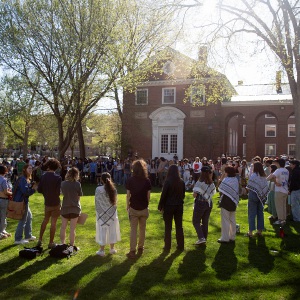 Dartmouth administration faces fierce criticism over protest arrests
Dartmouth administration faces fierce criticism over protest arrests
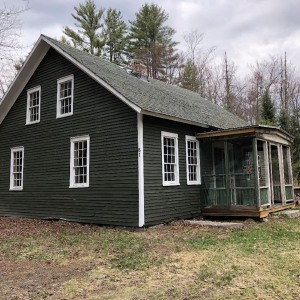 Hanover house added to New Hampshire Register of Historic Places
Hanover house added to New Hampshire Register of Historic Places
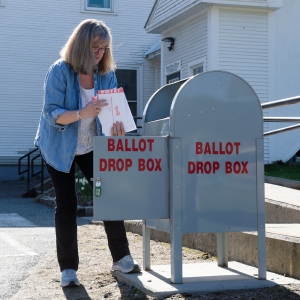 Sharon voters turn back proposal to renovate school
Sharon voters turn back proposal to renovate school
Haskins is now part of an effort to organize another group of Dartmouth students — albeit much smaller, but with larger ramifications.
Haskins and his basketball teammates are trying to become the first collegiate athletic team in the country to unionize. It would give them the ability to collectively bargain for pay and other benefits.
In an op-ed that appeared in the college’s daily student newspaper, The Dartmouth, this fall, Haskins and junior Romeo Myrthil, who were chosen by their teammates to speak about the effort, explained the reasoning.
“Many of our players currently juggle part-time jobs alongside their academic and athletic commitments to help pay for their tuition and living expenses,” wrote Haskins and Myrthil, who is also a team captain.
“While we currently receive many forms of non-traditional compensation, these don’t pay our bills and so we are unionizing to be compensated like other student employees, with hourly wages similar to other student wages on campus or scholarships. This would alleviate the need for second jobs and enhance our experience as part of the Dartmouth community.”
(Non-traditional compensation includes $1,200 a year for six pairs of basketball shoes.)
After a home game in November, I talked with Haskins, Myrthil and Robert McRae III, the team’s other captain from Inglewood, Calif.
“There’s a big misconception about us since we’re in the Ivy League,” said McRae, who works in the college’s fitness center. “We’re not a bunch of rich kids. We’re struggling financially while we’re here.”
Still it comes as no surprise that one of the country’s wealthiest colleges is going to the mat to block the players from unionizing. Dartmouth has brought in the same Boston law firm that it used in its attempt to stop students who work in dining services from organizing. Morgan, Brown & Joy promotes itself as the “oldest and largest management-side employment law firm in New England.”
Dartmouth — through its lawyers’ filings with the National Labor Relations Board — is trying to make a case that a union would bring dire consequences.
“If the College were to agree to pay the students a wage for playing on the basketball team, the students and the College would immediately become unable to compete in the Ivy League or the NCAA,” according to an Oct. 27 brief to the NLRB, as the federal agency is known.
The players’ attorney, John Krupski, of Concord, fired back that under the current system, players are powerless. Dartmouth “controls the personal lives of the players,” to the point the coaching staff “even determines bedtime” when the team is traveling, Krupski told the NLRB in his brief.
Rhetoric aside, the issue before the NLRB is fairly straightforward:
Should the players be considered employees of the college?
Or are they “student-athletes,” who voluntarily participate in an extracurricular activity?
In early October, the two sides presented their cases in a four-day NLRB hearing. It’s now up to Laura Sacks, director of the NLRB’s regional office in Boston, to decide whether the Dartmouth players can hold a union election.
Her ruling is expected later this month.
Sacks’ decision will “set in motion a process that could eventually lead to college athletes at private colleges across the U.S. gaining employee recognition,’ ” Michael McCann, a professor at the University of New Hampshire Franklin Pierce School of Law, wrote in a legal commentary for Sportico, a sports business website.
McCann, who specializes in sports and entertainment law, posed the questions that are fundamental to the case: “Are fundraising and alumni relations responsibilities part of a student activity? Are they work?”
No matter which way Sacks goes, the losing side is almost certain to appeal to the five-member NLRB in Washington. From there, it could head to federal court.
If the players are successful, they’ll become members of Local 560 of the Service Employees International Union. The SEIU has represented Dartmouth’s blue-collar workers since 1966.
In early September, the team met with Local 560 President Chris Peck, a longtime painter at the college, and Krupski, the union’s attorney.
“We had a good conversation about what the union could mean for them,” Peck told me in a recent interview. “Right now, it’s crazy. They’re having to juggle classes and being an athlete with working.”
“If we can negotiate some fair wages, they won’t have to work other jobs and they’ll have more opportunities to enjoy the Dartmouth experience like other students,” Peck added.
After Peck and Krupski left the meeting, the players signed cards that indicated they wanted to join Local 560, which along with SEIU International is picking up their legal bills.
The players could have aligned themselves with a number of unions, or gone out on their own like student-workers in dining services did.
“We wanted to form a connection with (college) employees,” Haskins told me, “and they’ve accepted us with open arms.”
The players stress they aren’t trying to get rich.
Students working non-union jobs on campus earn $16 an hour. If players received similar compensation, it’s estimated they’d make roughly $10,000 a year. (The NCAA, the governing body for college athletics, limits players to 20 hours per week for basketball-related activities during the season. Participation in fundraising events doesn’t count toward the 20-hour limit.)
Players want more than just a paycheck. Haskins and Myrthil wrote in their op-ed that “several of our players have suffered serious injuries during practices or games and needed to pay substantial amounts of money out of pocket to cover their health insurance deductibles.”
“We believe Dartmouth should be held responsible for those costs and any long-term disabilities that may arise from our participation in Dartmouth sports.”
Even if the players win out, McRae, one of four seniors on the team, will have graduated before any agreement with the college is reached. Still, he didn’t hesitate to get behind the effort.
“It would be selfish of me not to want to help,” McRae told me. “I want to support my teammates and players in the future.”
It’s conceivable the basketball staff, which includes four coaches and a director of operations, could benefit in non-financial ways from players being part of a union as well.
“It will definitely help in recruiting,” Haskins said.
“It becomes much more attractive if Dartmouth can tell recruits they won’t have to get other jobs to support themselves while they’re here,” Myrthil added.
I wanted to get Head Coach David McLaughlin’s take on the potential impact unionization could have on his program, but he politely declined my interview request.
In an email, McLaughlin, who is in his eighth year as coach, wrote, “I do appreciate you taking the time to talk with a few of our players and allow them to share some of their views.”
“My focus is currently on our season, and I don’t have anything to offer to that matter. I just want to be clear that unionization is my students’ efforts and not mine.”
I suppose it could be argued the generous need-based financial aid packages that a majority of players receive is payment enough.
Eleven of the 15 players are paying nothing or a fraction of the sticker price for an Ivy League education.
The same can’t be said for many of Dartmouth’s 4,500 undergraduates. Roughly half of the students come from families with the financial means to pay full fare, which totals around $350,000 over four years.
As recruited athletes (the basketball team has no walk-ons), the players also receive preferential treatment in the admission process. With more than 28,000 applicants vying for 1,100 slots, Dartmouth’s acceptance rate is 6%.
While they have strong academic records, the players themselves acknowledge it’s unlikely they would have been admitted at Dartmouth, if not for their basketball talents. (Something similar could be said of many legacy students.)
In June 2021, the U.S. Supreme Court issued a unanimous decision in a class action antitrust lawsuit that a former West Virginia University running back named Shawne Alston and other college athletes brought against the NCAA.
In NCAA v. Alston, justices ruled the organization overseeing college athletics doesn’t enjoy immunity from antitrust laws.
In his concurring opinion, Justice Brett Kavanaugh stated the “NCAA’s business model of using unpaid student athletes to generate billions of dollars in revenue for the colleges raises serious questions under the antitrust laws.”
A potential answer: “Colleges and student athletes could potentially engage in collective bargaining (or seek some other negotiated agreement) to provide student athletes a fairer share of the revenues they generate for their colleges,” Kavanaugh wrote.
A few months after the Supreme Court’s decision was announced, NLRB General Counsel Jennifer Abruzzo issued a memo to the federal agency’s field offices that stated student-athletes are employees of their academic institutions under the National Labor Relations Act. College athletes have the “right to act collectively to improve their terms and conditions of employment,” Abruzzo said.
Dartmouth’s basketball players aren’t the first to attempt to unionize. In 2014, an effort by football players at Northwestern University failed when the NLRB decided not to accept jurisdiction over the matter.
“Times have also changed since the Northwestern matter, with Supreme Court justices and other federal judges bluntly repudiating college amateurism as exploitative and antiquated,” McCann wrote in his Nov. 6 commentary for Sportico.
“The NCAA has been taking advantage of students who play on athletic teams for years,” Myrthil said. “There’s need for change.”
After the four-day hearing, attorneys for Dartmouth and Local 560 filed lengthy briefs to bolster their sides’ arguments.
If Dartmouth had to collectively bargain with players, the college’s lawyers posed hypothetical issues:
“Would the parties have to negotiate over less practice time? Playing time in games?”
It’s safe to say that’s not what the players are seeking.
The lawyers also stressed that Dartmouth and the seven other Ivy League schools don’t offer athletic scholarships. Financial aid is based on need. Which means even if a player leaves the team, he still keeps his aid.
That separates Dartmouth and its Ivy League peers from the football and basketball factories of the NCAA’s major conferences, lawyers at Morgan, Brown & Joy contend.
The basketball program isn’t a moneymaker, the college informed the NLRB. In the last five years, the program has suffered losses totaling almost $3.3 million. In the last year alone, the program finished $855,369 in the red.
“Dartmouth has never profited from its men’s basketball program and, as a result, is completely distinguishable from any university that generates significant revenue from its sports teams,” the college’s post-hearing brief stated.
“It is undisputed that the men’s basketball program provides no economic benefit to the College whatsoever.”
I’d say that’s highly questionable.
The ledger sheet that Dartmouth presented to the NLRB doesn’t take into account the millions of dollars in donations its athletic department has raked in over the years.
The brief fails to mention that the recent capital campaign, “The Call to Lead,” raised $178 million for athletics. (Overall, the campaign brought in nearly $3.8 billion.)
Then there’s the Friends of Dartmouth Basketball, which consists mostly of alums, that raised $304,000 last year, including eight gifts of $10,000 or more. The money is used to “enhance player development, support team travel, and expand our recruiting,” a college website states.
In its post-hearing brief, Dartmouth argued “no evidence demonstrates that men’s basketball players participate in fundraising activities, solicit donations, or are otherwise responsible for fundraising.”
“Fundraising is not tied to men’s basketball players, or their individual basketball activities, in any way.”
Dartmouth players beg to differ. In its season opener on Nov. 6, Dartmouth played at national powerhouse Duke, where tickets are hard to come by. Duke, which plays in 9,314-seat Cameron Indoor Stadium, has sold out more than 500 consecutive home games, dating back to 1990.
As the visiting team, Dartmouth received a small allotment of game tickets. Many of the tickets (I’m told it was about 75) went to alums. Along with seats behind the Dartmouth bench, alums were invited to join players and coaches for a meal and also watch a team practice.
To get the package deal, all any alum had to do was write Dartmouth a check for $5,000.
Among those attending the game, which Duke won, 92-54, was Stephen Lewinstein, a real estate developer and co-owner of the Boston Celtics. Earlier this year, Dartmouth announced that Lewinstein, a 1963 graduate, and his wife, Diana, had “committed the largest gift in the history of Dartmouth athletics.” (The college isn’t saying how much the gift was for, but I’ve heard figures ranging from $30 million to $50 million.)
In exchange, the college is renaming Alumni Gym the Lewinstein Athletic Center, featuring a new training facility that will “add functionality, efficiency, and cutting-edge therapeutic tools to support the health and wellness of student-athletes,” a college news release stated.
At the Division I level, basketball is a year-round commitment. The 2023-24 regular season of practices and 27 games stretches into early March. Games played away from Hanover sometimes require players to miss classes. In the off-season, there are “captains’ practices and conditioning sessions, along with work in the weight room.
“It’s a lot harder than any other job that I’ve had on campus,” said Haskins, the player chosen to testify at the NLRB hearing.
In his post-hearing brief, Krupski pointed out that Haskins is a member of the union that represents student-workers in dining services, but he “cannot obtain the same respect and privileges when he works on the basketball court.”
A player can be an “athlete, a student and an employee at the same time,” Krupski wrote. “It is indisputable that the players perform valuable services for the college through their work on and off the basketball court.”
The type of work, the players assert, that’s more than just a game.
Jim Kenyon can be reached at jkenyon@vnews.com.

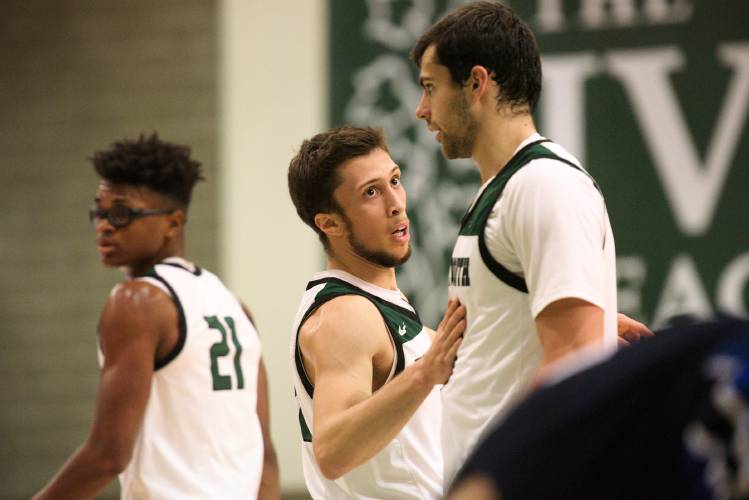
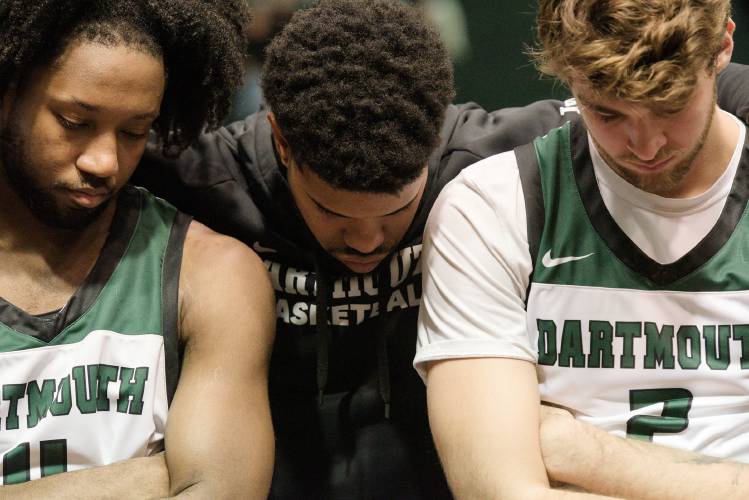
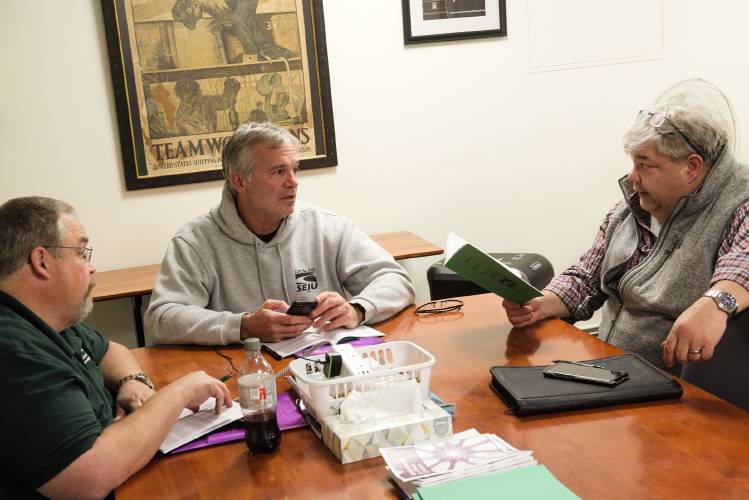

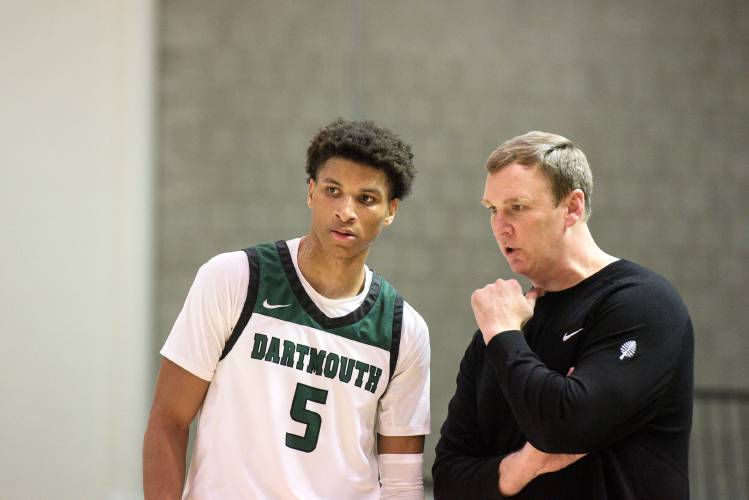
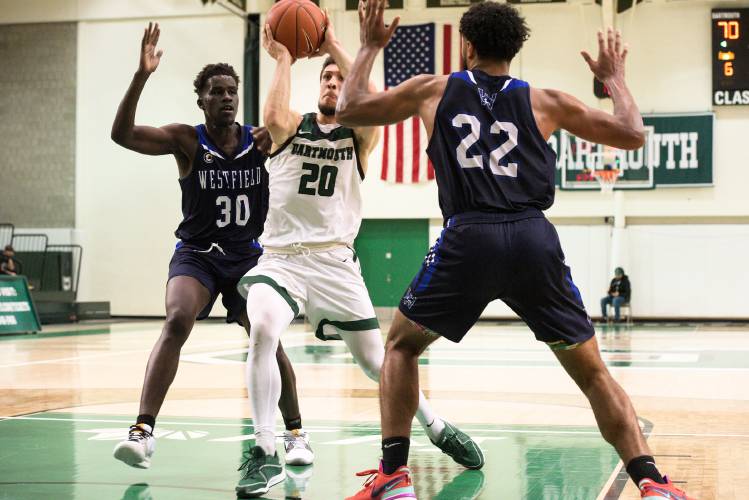
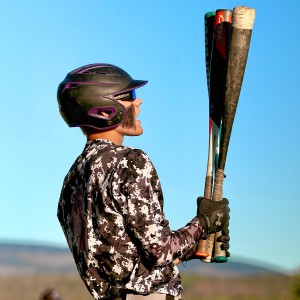 Young Oxbow baseball team struggles, but coach still finds joy in teaching the game
Young Oxbow baseball team struggles, but coach still finds joy in teaching the game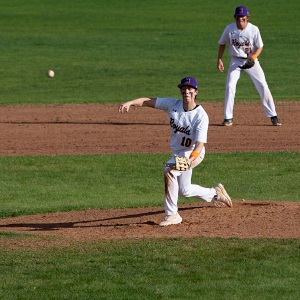 Local Roundup: Hartford tops Woodstock in close girls lacrosse contest
Local Roundup: Hartford tops Woodstock in close girls lacrosse contest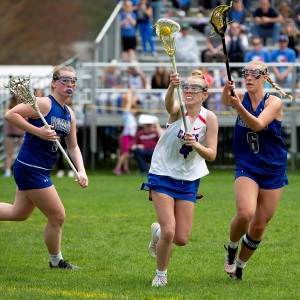 Hurricanes earn 10-9 victory over U-32 in girls lacrosse
Hurricanes earn 10-9 victory over U-32 in girls lacrosse Stevens, Newport baseball split high-scoring games
Stevens, Newport baseball split high-scoring games
